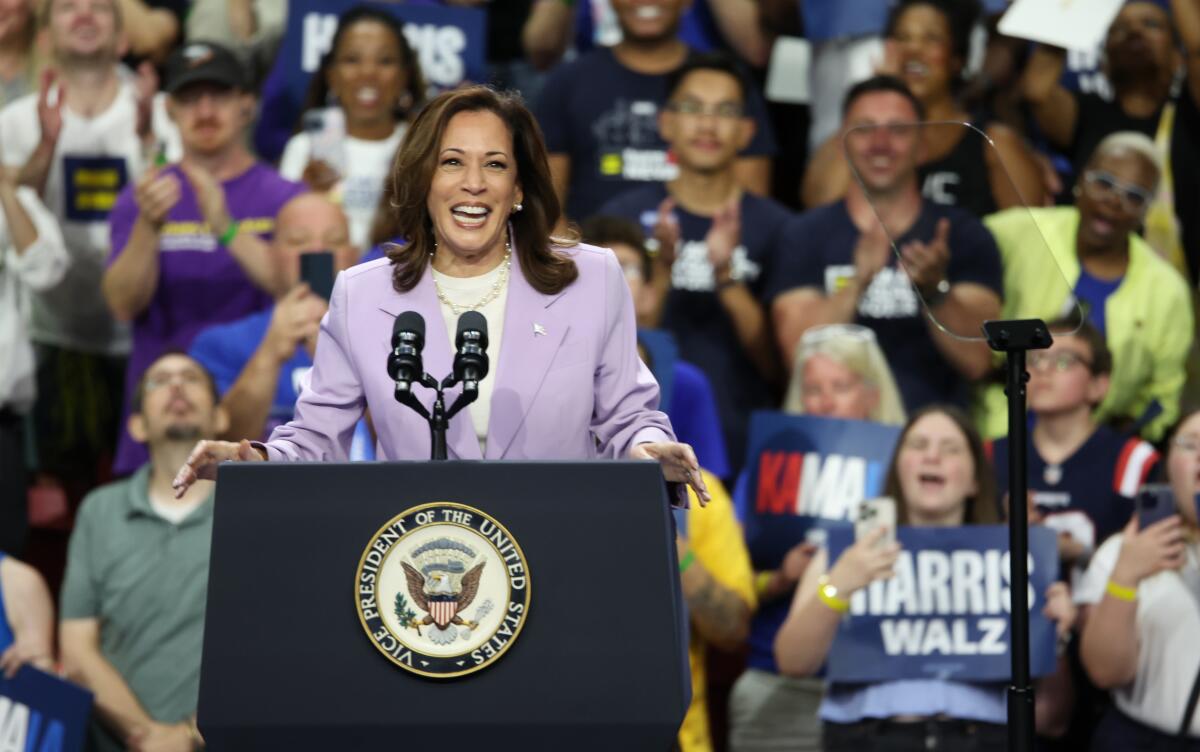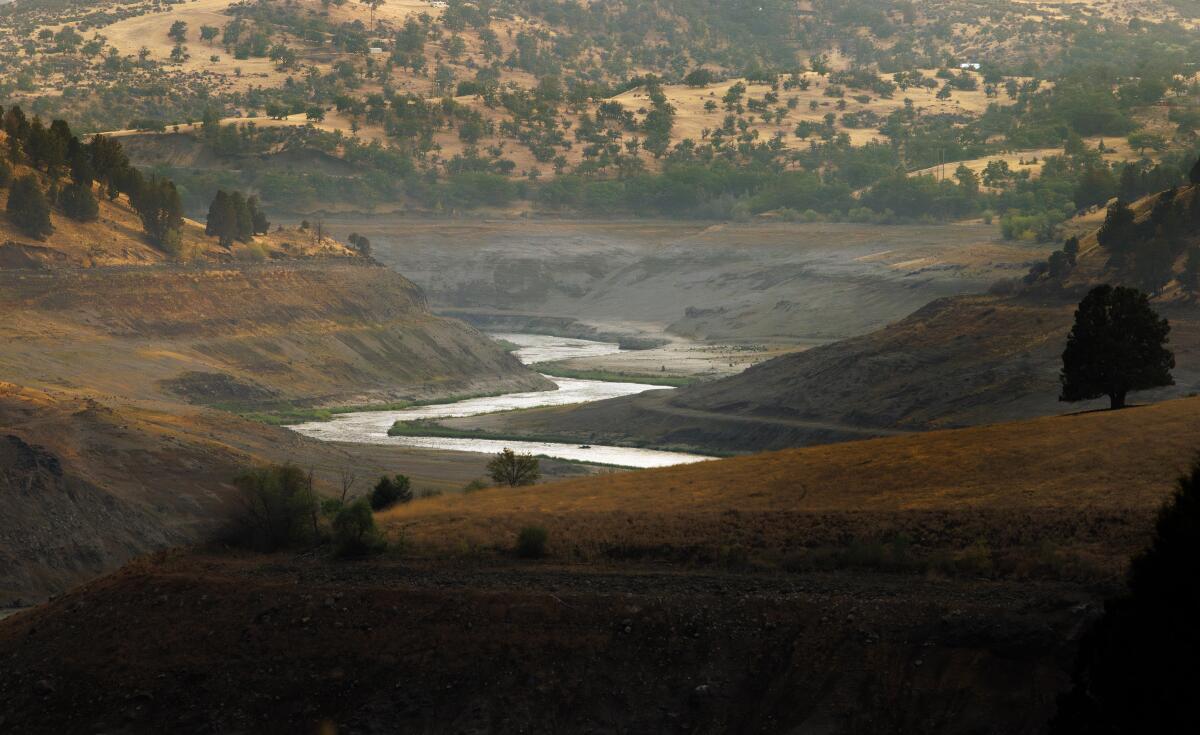Colleges tighten security and rules after damaging spring protests

- Share via
Good morning. It’s Thursday, Aug. 29. I’m Jaweed Kaleem, an education reporter at The Times. Here’s what you need to know to start your day.
- College students are not happy about tighter restrictions on campus protests.
- Vice President Kamala Harris and Gov. Tim Walz will have their first joint TV interview today.
- Weeks after California’s indoor heat standards took effect, workers still swelter.
- And here’s today’s e-newspaper
You're reading the Essential California newsletter
Our reporters guide you through our biggest news, features and recommendations every morning
You may occasionally receive promotional content from the Los Angeles Times.
Colleges tighten security and rules after damaging spring protests
As colleges begin to reopen, administrators are doubling down on campus rules and student codes of conduct: There will be zero tolerance for encampments and kinds of activism that violates college policies. Some are also going further. New ID checks, gates and campus safety officers are being added to keep tents, outsiders and illegal building occupations at bay.
Some students, whether they’re activists who campaigned for colleges to divest from Israel or not, aren’t happy about it.
“It’s overblown,” Lawrence Sung, a senior studying international relations and global business at USC, told me about changes at his campus. Sung said University Park is becoming closer to resembling “a fortress” after closing its gates to the public. Now, students, staff and faculty enter through express lanes using their IDs while guests must be preregistered.
Tall, black fencing also cordons off parts of Alumni Park, the heart of campus and site of the spring’s pro-Palestinian encampments. Students are allowed to enter the park, where they typically rest beneath shade trees, only through specified entries and exits.
Most universities issue edicts
The shifts are not only taking place at USC, where police arrested 93 people, roughly half of them students, in April as officers cleared an encampment weeks before a high-security commencement with fencing, bag checks and metal detectors.
Across the 10-campus University of California and 23-campus California State University systems, administrators say they will strictly enforce codes of conduct barring camping, a rule that was previously unevenly enforced.
UC and CSU will face a test Thursday: Students at UC Berkeley plan to protest in front of Sproul Hall, the site of 1960s civil rights rallies that pro-Palestinian activists used as an encampment space in the spring. Will the students pitch tents? And if they do, how will the university respond? Similar questions will arise at San Francisco State University, where a protest is also planned.
The biggest challenge may be at UCLA, which begins classes in mid-September. In the spring, 231 people were arrested over multiple encampments. In one clash that made international headlines, vigilantes attacked an encampment overnight while police stood by for hours. The incident triggered the removal of the university’s police chief and the creation of a new campus safety office. Former Chancellor Gene Block faced questioning during a congressional hearing on campus antisemitism.
UCLA activists tell me they are planning to still rally in the fall despite UC directives on protest. Pro-Israel Jewish groups that were opposed to the encampment and accused it of antisemitism say they also are keeping an eye out.
That includes a collection of on- and off-campus organizations — Chabad, Hillel and the Jewish Federation of Los Angeles among them — that plan to hold a gathering next month at Stephen Wise Temple for an “in-depth exploration of the challenges which they faced over the last year as well as upcoming challenges this fall.”
With the Israel-Hamas war continuing and a presidential election in a little over two months, it’s shaping up to be a busy fall of protest uncertainties at California universities.
Today’s top stories

Harris and Walz have their first joint TV interview today
- The taped interview with CNN’s Dana Bash will air 6 p.m. Pacific, coming weeks after commentators noted that Democratic nominee Kamala Harris has not done a formal media interview since President Biden dropped out of the race.
- Meanwhile, a Times analysis of campaign contributions found nearly 70% of Harris’ support was from donors who had not given previously to Biden in this election cycle.
- In other news, Walz is a car guy who owns a quirky retro SUV that has gained a sizable following in recent years.
Weeks after California’s indoor heat standards took effect, workers still swelter
- Interviews with workers and union leaders indicate compliance with the new rules varies by industry and workplace.
- Many workers said they weren’t aware of the new rules, which require employers to provide easy access to clean drinking water and cooling areas, and to monitor workers for signs of heat illness whenever work site temperatures reach or exceed 82 degrees.
State lawmakers passed home mortgage aid for undocumented immigrants, wavered on Newsom’s package of energy bills
- The California Assembly gave final approval to a bill that could help undocumented immigrants buy homes, despite opposition from Republicans who said it would encourage more Mexican immigrants to cross the border illegally.
- Gov. Gavin Newsom threatened to call a special session in the fall as lawmakers wobbled on a package of energy bills that includes a customer credit for gas and electricity bills.
California passed restrictions on cellphones in schools. But some student have already found workarounds
- State lawmakers approved the Phone-Free Schools Act, which would require all public schools to devise a policy by July 1, 2026, to limit or prohibit smartphones during the school day.
- A smattering of schools throughout Los Angeles have already enacted bans and restrictions but find it’s tough to enforce. Some students, for example, get around the rules by bringing multiple phones to school.
More big stories
- The Supreme Court kept on hold a plan by President Biden to reduce student loan monthly payments for millions of borrowers.
- Mayor Karen Bass demanded an investigation after lead was found in Watts drinking water.
- While an Orange County supervisor was under scrutiny, his daughter interned with county prosecutors.
- A sophisticated “crime tourism” ring in SoCal stole millions in heists, federal prosecutors say.
- A Southern California couple living on a nudist ranch mysteriously disappeared, police say.
- LeBron James offered many ways for son Bronny to address him as a Lakers teammate. Just one thing though: he “cannot call me ‘Dad’ in the workplace,” James said.
Get unlimited access to the Los Angeles Times. Subscribe here.
Commentary and opinions
- Donald Trump’s crimes present a challenge for Kamala Harris’ campaign, Harry Litman argues.
- California should consider parole for people sentenced to life behind bars 35 years ago, The Times’ editorial board writes.
- Attacks on diversity programs show the need to keep them going, and improve, Henry Tran writes.
- President Biden can do more to free Venezuela of Nicolás Maduro’s illegitimate regime, Kristina Foltz argues.
Today’s great reads
The largest dam removal project in U.S. history is nearly complete, raising hopes among Indigenous people for a Klamath River salmon revival. Salmon are central to the culture and fishing tradition of Native tribes along the river. But dams have long blocked the fish from reaching ancestral spawning areas.
Other great reads
- L.A. native and Paralympian Ezra Frech says normalizing disability is his ultimate gold medal.
- Are Mexican drug cartels as powerful as people think?
How can we make this newsletter more useful? Send comments to essentialcalifornia@latimes.com.
For your downtime
Going out
- 🪩 Here are six L.A. parties that’ll take you to another part of the world.
- 🌲 Try this “chill Yosemite” if you’re looking for an outdoor wonderland without crowds.
- 🌮 A new Cypress Park taqueria brings a taste of Tijuana — from the family behind a popular TJ taco chain.
Staying in
- 🔪 Watch chef Mary Sue Milliken of Socalo and Border Grill up the herbs and spices for maximum-flavor grilled ribs.
- 📖 An undercover agent aims to disrupt the work of climate activists in sexy, cerebral “Creation Lake.”
- 🧑🍳 Here’s a recipe for spicy cantaloupe and ginger pops.
- ✏️ Get our free daily crossword puzzle, sudoku, word search and arcade games.
And finally ... from our archives
Hurricane Katrina made landfall on Aug. 29, 2005 after a mandatory evacuation was ordered in New Orleans — a first in the city’s history. Then-Mayor C. Ray Nagin of New Orleans called the storm a “once-in-a-lifetime event.”
Have a great day, from the Essential California team
Ryan Fonseca, reporter
Defne Karabatur, fellow
Andrew Campa, Sunday reporter
Hunter Clauss, multiplatform editor
Christian Orozco, assistant editor
Stephanie Chavez, deputy metro editor
Karim Doumar, head of newsletters
Check our top stories, topics and the latest articles on latimes.com.
Sign up for Essential California
The most important California stories and recommendations in your inbox every morning.
You may occasionally receive promotional content from the Los Angeles Times.






